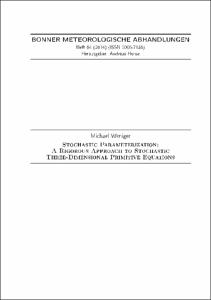Weniger, Michael: Stochastic Parameterization: A Rigorous Approach to Stochastic Three-Dimensional Primitive Equations. - Bonn, 2014. - Dissertation, Rheinische Friedrich-Wilhelms-Universität Bonn.
Online-Ausgabe in bonndoc: https://nbn-resolving.org/urn:nbn:de:hbz:5n-35385
Online-Ausgabe in bonndoc: https://nbn-resolving.org/urn:nbn:de:hbz:5n-35385
@phdthesis{handle:20.500.11811/6058,
urn: https://nbn-resolving.org/urn:nbn:de:hbz:5n-35385,
author = {{Michael Weniger}},
title = {Stochastic Parameterization: A Rigorous Approach to Stochastic Three-Dimensional Primitive Equations},
school = {Rheinische Friedrich-Wilhelms-Universität Bonn},
year = 2014,
month = apr,
volume = 64,
note = {The atmosphere is a strongly nonlinear and infinite-dimensional dynamical system acting on a multitude of different time and space scales. A possible problem of numerical weather prediction and climate modeling using deterministic parameterization of subscale and unresolved processes is the incomplete consideration of scale interactions. A stochastic treatment of these parameterizations bears the potential to improve the simulations and to provide a better understanding of the scale interactions of the simulated atmospheric variables. The scientific community that is dealing with stochastic meteorological models can be divided into two groups: the first one uses pragmatic approaches to improve existing complex models. The second group pursues a mathematical rigorous way to develop stochastic models, which is currently limited to conceptual models. The overall objective of this work is to narrow the gap between pragmatic approaches and the mathematical rigorous methods. Using conceptual climate models, we point out that a stochastic formulation must not be chosen arbitrarily but has to be derived based on the physics of the system at hand. Equally important is a rigorous numerical implementation of the resulting stochastic model. The dynamics of sub grid and unresolved processes are often described by time continuous stochastic processes, which cannot be treated with deterministic numerical schemes. We show that a stochastic formulation of the three-dimensional primitive equations fits in the mathematical framework of abstract stochastic fluid models. This allows us to utilize recent results regarding existence and uniqueness of solutions of such systems. Based on these theoretical results we propose a Galerkin scheme for the discretization of spatial and stochastic dimensions. Using the framework of mild solutions of stochastic partial differential equations we are able to prove quantitative error bounds and strong mean square convergence. Under additional assumptions we show the convergence of a numerical scheme which combines the Galerkin approximation with a temporal discretization.},
url = {https://hdl.handle.net/20.500.11811/6058}
}
urn: https://nbn-resolving.org/urn:nbn:de:hbz:5n-35385,
author = {{Michael Weniger}},
title = {Stochastic Parameterization: A Rigorous Approach to Stochastic Three-Dimensional Primitive Equations},
school = {Rheinische Friedrich-Wilhelms-Universität Bonn},
year = 2014,
month = apr,
volume = 64,
note = {The atmosphere is a strongly nonlinear and infinite-dimensional dynamical system acting on a multitude of different time and space scales. A possible problem of numerical weather prediction and climate modeling using deterministic parameterization of subscale and unresolved processes is the incomplete consideration of scale interactions. A stochastic treatment of these parameterizations bears the potential to improve the simulations and to provide a better understanding of the scale interactions of the simulated atmospheric variables. The scientific community that is dealing with stochastic meteorological models can be divided into two groups: the first one uses pragmatic approaches to improve existing complex models. The second group pursues a mathematical rigorous way to develop stochastic models, which is currently limited to conceptual models. The overall objective of this work is to narrow the gap between pragmatic approaches and the mathematical rigorous methods. Using conceptual climate models, we point out that a stochastic formulation must not be chosen arbitrarily but has to be derived based on the physics of the system at hand. Equally important is a rigorous numerical implementation of the resulting stochastic model. The dynamics of sub grid and unresolved processes are often described by time continuous stochastic processes, which cannot be treated with deterministic numerical schemes. We show that a stochastic formulation of the three-dimensional primitive equations fits in the mathematical framework of abstract stochastic fluid models. This allows us to utilize recent results regarding existence and uniqueness of solutions of such systems. Based on these theoretical results we propose a Galerkin scheme for the discretization of spatial and stochastic dimensions. Using the framework of mild solutions of stochastic partial differential equations we are able to prove quantitative error bounds and strong mean square convergence. Under additional assumptions we show the convergence of a numerical scheme which combines the Galerkin approximation with a temporal discretization.},
url = {https://hdl.handle.net/20.500.11811/6058}
}






